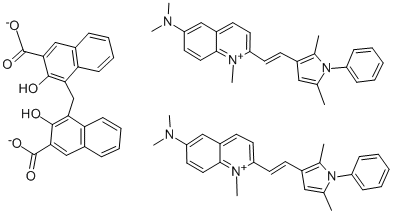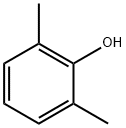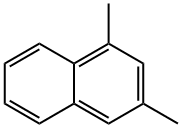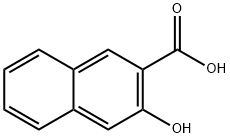PYRVINIUM PAMOATE
Synonym(s):PP;Vermitibier;Vipyrvinium embonate;6-(Dimethylamino)-2-[2-(2,5-dimethyl-1-phenyl-1H-pyrrol-3-yl)ethenyl]-1-methyl-4,4′-methylenebis[3-hydroxy-2-naphthalenecarboxylate] (2:1)-quinolinium;Alnoxin
- CAS NO.:3546-41-6
- Empirical Formula: C75H70N6O6
- Molecular Weight: 1151.39
- MDL number: MFCD00010090
- EINECS: 222-596-3
- SAFETY DATA SHEET (SDS)
- Update Date: 2024-12-18 14:08:52

What is PYRVINIUM PAMOATE?
Description
Pyrvinium is a tasteless, odorless, bright orange to black, crystalline solid. It is insoluble in water or ether, slightly soluble in chloroform, and soluble in glacial acetic acid.
The Uses of PYRVINIUM PAMOATE
Pyrvinium Pamoate is a potent noncompetitive inhibitor of the androgen receptor, with the application towards prostate cancer treatment. Antihelmintic.
The Uses of PYRVINIUM PAMOATE
anthelmintic
Definition
ChEBI: Pyrvinium pamoate is a naphthoic acid. It has a role as an anticoronaviral agent.
Indications
The cation is the active part of the compound. Pyrvinium is used against pinworms (Enterobius).
brand name
Povan (Parke-Davis).
General Description
Odorless bright orange or orange-red to brownish red or almost black fluffy powder. Melting point 210-215°C. Insoluble in water. Tasteless.
Air & Water Reactions
Insoluble in water.
Reactivity Profile
PYRVINIUM PAMOATE is light sensitive. Incompatible with strong oxidizing agents, strong acids and bases .
Fire Hazard
Flash point data for PYRVINIUM PAMOATE are not available; however, PYRVINIUM PAMOATE is probably combustible.
Biochem/physiol Actions
Pyrvinium pamoate is a potent androgen receptor inhibitor. Androgen receptors (ARs) are nuclear hormone receptors/transcription factors that reside in the cytoplasm and activated by testosterone and dihydrotestosterone. AR inhibitors have potential therapeutic benefit in prostate cancer; competitive inhibitors and chemical castration methods have been discovered, but both therapies have undesirable side effects and/or resistance potential. A screen for non-competitive inhibitors was performed, resulting in the discovery of pyrvinium as an AR inhibitor. In comparison to competitive inhibitors, this compound does not bind to the ligand-binding domain of AR or block DNA occupancy by AR, but it inhibits AR-dependent gene expression via a distinct signaling mechanism. It is more potent than classical competitive AR antagonists and exhibits synergy with other AR inhibitors.
Side Effects
Occasional adverse reactions are blood dyscrasia and folic acid deficiency. Rare adverse reactions are rash, vomiting, convulsion, shock, photosensitivity, and headache.
Properties of PYRVINIUM PAMOATE
| Melting point: | 210-215° (softens at 190°) |
| Boiling point: | 829.27°C (rough estimate) |
| Density | 1.0104 (rough estimate) |
| refractive index | 1.6400 (estimate) |
| storage temp. | 2-8°C |
| solubility | DMSO: >10mg/mL |
| form | powder |
| color | red |
| EPA Substance Registry System | Pyrvinium pamoate (3546-41-6) |
Safety information for PYRVINIUM PAMOATE
| Signal word | Warning |
| Pictogram(s) |
 Exclamation Mark Irritant GHS07  Health Hazard GHS08 |
| GHS Hazard Statements |
H315:Skin corrosion/irritation H319:Serious eye damage/eye irritation H335:Specific target organ toxicity, single exposure;Respiratory tract irritation H351:Carcinogenicity |
| Precautionary Statement Codes |
P280:Wear protective gloves/protective clothing/eye protection/face protection. P301+P312:IF SWALLOWED: call a POISON CENTER or doctor/physician IF you feel unwell. P305+P351+P338:IF IN EYES: Rinse cautiously with water for several minutes. Remove contact lenses, if present and easy to do. Continuerinsing. P308+P313:IF exposed or concerned: Get medical advice/attention. |
Computed Descriptors for PYRVINIUM PAMOATE
New Products
(S)-3-Aminobutanenitrile hydrochloride 4-Methylphenylacetic acid N-Boc-D-alaninol N-BOC-D/L-ALANINOL Tert-butyl bis(2-chloroethyl)carbamate 3-Morpholino-1-(4-nitrophenyl)-5,6-dihydropyridin- 2(1H)-one Furan-2,5-Dicarboxylic Acid Tropic acid 1-Bromo-3,5-Di-Tert-Butylbenzene S-2-CHLORO PROPIONIC ACID ETHYL ISOCYANOACETATE 2-Bromo-1,3-Bis(Dimethylamino)Trimethinium Hexafluorophosphate 4-IODO BENZOIC ACID 3-NITRO-2-METHYL ANILINE 1-(2,4-DICHLOROPHENYL) ETHANAMINE (2-Hydroxyphenyl)acetonitrile 4-Bromopyrazole 2-(Cyanocyclohexyl)acetic acid 4-methoxy-3,5-dinitropyridine 1-(4-(aminomethyl)benzyl)urea hydrochloride 2-aminopropyl benzoate hydrochloride diethyl 2-(2-((tertbutoxycarbonyl)amino) ethyl)malonate tert-butyl 4- (ureidomethyl)benzylcarbamate Ethyl-2-chloro((4-methoxyphenyl)hydrazono)acetateRelated products of tetrahydrofuran








You may like
-
 Pyrvinium pamoate salt hydrate 98% (HPLC) CAS 3546-41-6View Details
Pyrvinium pamoate salt hydrate 98% (HPLC) CAS 3546-41-6View Details
3546-41-6 -
 Pyrvinium pamoate salt hydrate CAS 3546-41-6View Details
Pyrvinium pamoate salt hydrate CAS 3546-41-6View Details
3546-41-6 -
 1975-50-4 98%View Details
1975-50-4 98%View Details
1975-50-4 -
 2-HYDROXY BENZYL ALCOHOL 98%View Details
2-HYDROXY BENZYL ALCOHOL 98%View Details
90-01-7 -
 2-Chloro-1,3-Bis(Dimethylamino)Trimethinium Hexafluorophosphate 221615-75-4 98%View Details
2-Chloro-1,3-Bis(Dimethylamino)Trimethinium Hexafluorophosphate 221615-75-4 98%View Details
221615-75-4 -
 61397-56-6 CIS BROMO BENZOATE 98%View Details
61397-56-6 CIS BROMO BENZOATE 98%View Details
61397-56-6 -
 14714-50-2 (2-Hydroxyphenyl)acetonitrile 98+View Details
14714-50-2 (2-Hydroxyphenyl)acetonitrile 98+View Details
14714-50-2 -
 118753-70-1 98+View Details
118753-70-1 98+View Details
118753-70-1